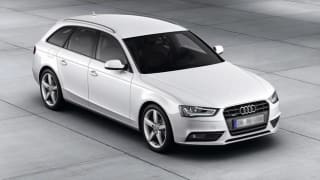
Audi A4 2.0 TDI 2012 review
Circle the wagons, the SUVs are coming. That's certainly the case in Australia as buyers opt for a...
Browse over 9,000 car reviews
Running on ‘the smell of an oily rag’, once an attempt at automotive humour, is no longer a joke when talking about diesel-powered cars. The new BMW 318d, for example, a diesel fuelled sedan, takes up the fuel economy battle to the hybrids.
At $56,400, the entry-level 318d limbos under the luxury car tax threshold bar with little to spare but can be tipped over into the higher bracket by a long list of cost options.
Standard features include dual-zone climate control, cruise control with brake function, power-operated windows and exterior mirrors, keyless engine start/stop, remote locking with boot open button, Multifunction steering wheel, automatic lights and windscreen wipers, rear Park Distance Control, Bluetooth connectivity for hands-free mobile phone use and MP3 compatible CD audio systems with Auxiliary and USB inputs.
Putting the BMW 318d in the ring with such petrol/electric hybrids is a four-cylinder TwinPower turbo-diesel engine that weighs in with a peak power output of 105 kW and maximum 320 Nm of torque. Fuel consumption is just 4.5 litres per 100km on the combined urban/highway cycle.
During our week with the new BMW 3 Series entry-level model we managed to get fuel consumption down to just 3.6 litres per hundred kilometres on the motorway and 6.1 in town, which goes a long way to matching petrol/electric hybrids.
However, diesels create significantly more CO2 than petrol/electric hybrids. As an example the BMW 318d has a Green Vehicle Guide rating of 118 grams per kilometre, compared with the Toyota Prius at 89 grams. Helping to achieve such low fuel consumption figures in the BMW 318d sedan is a cutting edge eight-speed automatic transmission. All 3 Series models also now feature auto start/stop, as standard, automatically cutting the engine at traffic lights or in stationary traffic to save fuel.
Further fuel saving measures include brake energy regeneration that has power for the vehicle electrical system being generated only during braking and overrun. The fitment of electric power steering, that only draws power when assistance is required in cornering, also helps reduce fuel usage.
Drivers and passengers have the benefit of the new Driving Experience Control which in the BMW 318d sets the tone with three driving modes – Comfort, Sport, and Eco Pro – working on powertrain, steering, throttle and Dynamic Stability Control settings.
Eco Pro, as well as altering throttle response and transmission shift points, keeps cabin heating and air-conditioning, optional heated seats and the exterior mirrors working at optimum efficiency, cutting fuel consumption by as much as 20 per cent. A fourth setting, Sport+, is available if the car is specified with Sport Line, Adaptive M Suspension or Variable Sports Steering option.
On the outside, the BMW 318d has the looks of a well-cut business suit, the result of extensive wind tunnel testing, which also contributes to fuel economy with a co-efficient of friction of Cd 0.26. The car gets down to business with 16-inch alloy wheels.
Inside, there’s more space than in the previous model and offers a high quality Sensatec man-made leather trim in beige or black. Focus is on the driver, with the cockpit layout being angled towards them by seven degrees to ensure controls are ergonomically positioned and fuel gauge, speedometer, rev counter and oil temperature gauge are easily visible. This extends to a full colour monitor being integrated into the top of the dashboard for all iDrive operations including information, entertainment, communication and navigation functions.
A new Active Protection package is fitted as standard across the new 3 Series. The system is automatically activated above 18 km/h when it gently tensions the driver and front passenger seatbelts. If a crash is likely, the seatbelts are further tightened and windows and sunroof (where fitted) are automatically closed. In the event of a crash the system will also automatically brake the car beyond the initial impact for 1.5 seconds to reduce the likelihood of a second collision.
Further safety options include a Lane Change Warning System and Lane Departure Warning System, including Collision Warning that tells the driver of a possible collision during a lane change manoeuvre or if the car strays out of its lane.
Performance, on the other hand, takes a hit with acceleration from zero to 100 kilometres an hour taking 9.3 seconds. If you want more performance, opt for the petrol driven 320i which hits the same speed a couple of seconds quicker. While there’s a premium purchase price to pay over the likes of the Prius and Civic, on running costs, the 318d takes the fuel sippers on in a fiscal fistfight. It’s close.
With 12 million sales around the world since its introduction in 1975, the BMW 3 Series is into its sixth generation and, with the 318d model adding further appeal, looks set to maintain its spot as a leading contender.
| Vehicle | Specs | Price* | |
|---|---|---|---|
| 335i Touring M Sport | 3.0L, PULP, 6 SP AUTO | $34,870 – 41,470 | 2012 BMW 3 Series 2012 335i Touring M Sport Pricing and Specs |
| 335i M Sport | 3.0L, PULP, 6 SP AUTO | $20,240 – 25,630 | 2012 BMW 3 Series 2012 335i M Sport Pricing and Specs |
| 335i M Sport | 3.0L, PULP, 7 SP AUTO | $24,970 – 30,800 | 2012 BMW 3 Series 2012 335i M Sport Pricing and Specs |
| 320d | 2.0L, Diesel, 6 SP MAN | $16,720 – 21,450 | 2012 BMW 3 Series 2012 320d Pricing and Specs |
$7,999
Lowest price, based on 51 car listings in the last 6 months